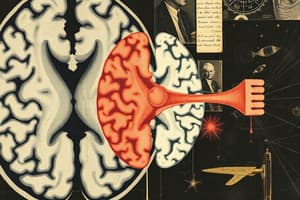Podcast
Questions and Answers
What characterizes a cerebrovascular accident (CVA)?
What characterizes a cerebrovascular accident (CVA)?
- Overproduction of cerebrospinal fluid
- Infection in the brain tissue
- Occlusion or hemorrhage of a blood vessel (correct)
- Increased blood flow to the brain
What is one major risk factor associated with cerebrovascular accidents?
What is one major risk factor associated with cerebrovascular accidents?
- Atrial fibrillation (correct)
- Chronic lung disease
- Diabetes mellitus type 1
- Hyperthyroidism
Which type of cerebrovascular accident is characterized by a temporary blockage of blood flow to the brain?
Which type of cerebrovascular accident is characterized by a temporary blockage of blood flow to the brain?
- Cerebral Infarction
- Permanent Ischemic Attack
- Hemorrhagic stroke
- Transient Ischemic Attack (TIA) (correct)
Which of the following is NOT a common cause of cerebrovascular accidents?
Which of the following is NOT a common cause of cerebrovascular accidents?
What is the global ranking of cerebrovascular accidents in terms of leading causes of death?
What is the global ranking of cerebrovascular accidents in terms of leading causes of death?
Which demographic is at higher risk of experiencing a stroke?
Which demographic is at higher risk of experiencing a stroke?
What is the primary factor that increases the risk of a cerebrovascular accident (CVA) significantly for individuals above systolic 160 mmHg?
What is the primary factor that increases the risk of a cerebrovascular accident (CVA) significantly for individuals above systolic 160 mmHg?
Which type of CVA is characterized by the blockage of blood flow in cerebral blood vessels?
Which type of CVA is characterized by the blockage of blood flow in cerebral blood vessels?
What is a significant consequence of a Transient Ischemic Attack (TIA)?
What is a significant consequence of a Transient Ischemic Attack (TIA)?
Which of the following symptoms could indicate the onset of a CVA?
Which of the following symptoms could indicate the onset of a CVA?
How important is the time since the onset of symptoms in treating ischemic strokes?
How important is the time since the onset of symptoms in treating ischemic strokes?
Which of the following factors is associated with a hemorrhagic CVA?
Which of the following factors is associated with a hemorrhagic CVA?
What is one of the main purposes of the Cincinnati Prehospital Stroke Scale?
What is one of the main purposes of the Cincinnati Prehospital Stroke Scale?
Which of the following is true regarding the treatment for ischemic CVA?
Which of the following is true regarding the treatment for ischemic CVA?
What characterizes a hemorrhagic CVA compared to an ischemic CVA?
What characterizes a hemorrhagic CVA compared to an ischemic CVA?
Which risk factor is associated with a threefold increased likelihood of experiencing a CVA?
Which risk factor is associated with a threefold increased likelihood of experiencing a CVA?
Flashcards are hidden until you start studying
Study Notes
Cerebrovascular Accident (CVA)
- Commonly referred to as "stroke" or "brain attack."
- Occurs due to occlusion or hemorrhage of a blood vessel, leading to a lack of oxygen and potential brain damage.
Types and Etiologies
- Types of CVA:
- Transient Ischemic Attack (TIA)
- Ischemic CVA
- Hemorrhagic CVA
- Etiologies:
- Thrombus: formed in blood vessel.
- Embolus: detached thrombus traveling through the bloodstream.
- Ruptured blood vessel causing hemorrhage.
Epidemiology
- 2nd leading cause of death worldwide, accounting for approximately 4.6 million fatalities annually.
- In the U.S., it ranks as the 5th leading cause of death and disability, occurring on average every 40 seconds.
- Higher risk for women; 1 in 5 women will experience a stroke in their lifetime.
Risk Factors
- Atrial fibrillation increases CVA risk by 5 times; affects ~2 million Americans.
- Oral contraceptives and menopause-related estrogen changes can elevate risk.
- Diabetes, familial history (3 times more likely), smoking, physical inactivity, and atherosclerosis are significant contributors.
- Hypertension: Every 10 mmHg increase over 160 systolic raises risk by 30%.
Transient Ischemic Attack (TIA)
- Often called a "mini stroke," similar to angina in relation to myocardial infarction.
- Results in temporary blood supply interruption to the brain; no permanent damage occurs.
- Lasts from 15 to 60 minutes and serves as an important warning sign for impending CVA.
Ischemic and Hemorrhagic CVA
- Ischemic CVA:
- Responsible for 85% of strokes; produces cerebral infarction due to blockage.
- Hemorrhagic CVA:
- Accounts for 15% of strokes; results from cerebral blood vessel rupture and can have a 50-60% mortality rate depending on the area affected.
Signs and Symptoms of CVA
- Symptoms may vary based on severity and location of brain damage, including:
- Confusion
- Difficulty finding or forming words
- Slurred speech
- Loss of balance and dizziness
- Weakness or numbness, often on one side (facial droop)
- Vision changes, such as loss of visual field.
- Importance of determining onset time of symptoms for treatment eligibility.
Emergency Management
- Emphasizes the phrase "Time is brain" indicating the urgency of treatment.
- For ischemic CVA, treatment is critical within 3 hours of symptom onset.
- Immediate actions include performing a stroke scale, noting the time, positioning the patient, and contacting emergency medical services.
Stroke Assessment Scales
- Cincinnati Prehospital Stroke Scale (CPSS):
- Assesses facial palsy, arm weakness, and speech difficulties.
- Los Angeles Pre-hospital Stroke Scale:
- Evaluates age, seizure history, time since onset, ambulatory status, and vital signs (glucose level, symmetric facial movement, grip strength).
Hospital Management
- CT scan is critical to identify whether the CVA is ischemic or hemorrhagic.
- Ischemic stroke may be treated with IV thrombolytic therapy (Alteplase) within 3 hours to restore blood flow, but is contraindicated in hemorrhagic cases.
- Surgical intervention may be necessary for hemorrhagic strokes.
Studying That Suits You
Use AI to generate personalized quizzes and flashcards to suit your learning preferences.





